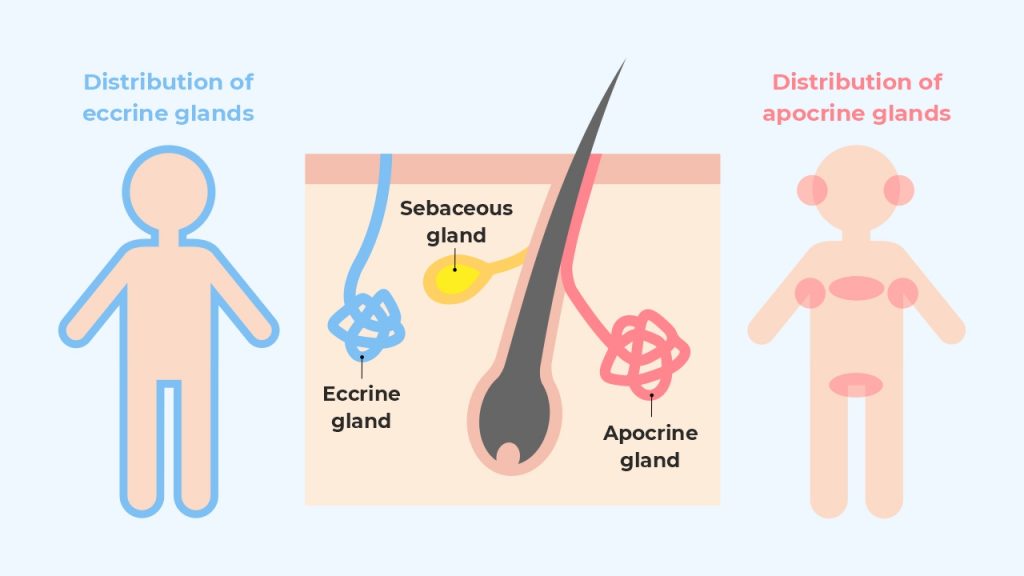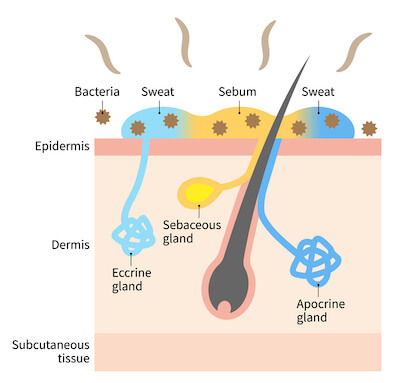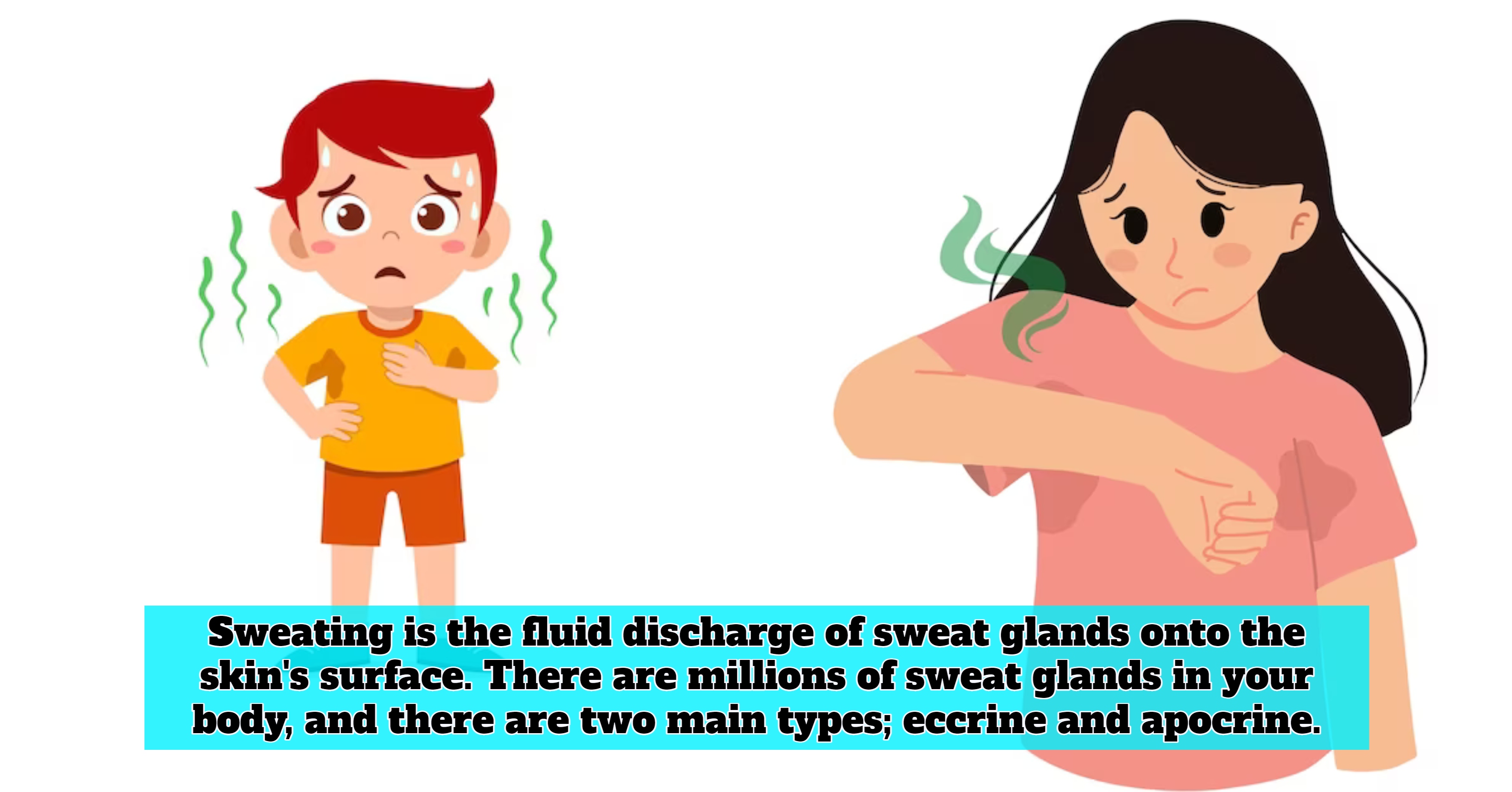For most of us, it takes little more than one sniff to recognise that typically repulsive, distinctive body odour. Yet, it’s a highly complex phenomenon influenced by heredity, body type, age, food, and hygiene factors. What exactly is this odour, then? Where does it originate? And what can we do about it?
Initially, only your excretion from your armpits and the bacteria that feed on them produce that recognisable odour. Sweat is a significant component of body odour that is typically associated with it.

What is body odour?
Though sweat doesn’t smell, it produces an unpleasant scent when sweat and skin bacteria combine. A person’s body odour may have an onion-like, sweet, sour, or tangy smell. Body odour is sometimes influenced by how much you sweat. Hence, even though they may not be sweating, a person can have an offensive body odour. In contrast, a person can sweat heavily without smelling.
Sweating is the fluid discharge of sweat glands onto the skin’s surface. There are millions of sweat glands in your body, and there are two main types: eccrine and apocrine.

Eccrine
Sweat is directly released to the skin’s surface by eccrine glands. Sweating aids in cooling your skin and regulating body temperature as it dries down. It doesn’t smell at all. The cooling impact of sweat on heated skin occurs when your body temperature increases due to physical activity or heat. Your body is mostly covered in eccrine glands, including the palms and soles.
Apocrine
Your hair follicles can access apocrine glands. The tube-like structure called a hair follicle holds your hair in place under your skin. Your armpits and groyne have apocrine glands. When sweat from these glands interacts with microorganisms on your skin, it can cause an odour. You cannot smell body odour in young children because apocrine glands do not function until puberty.
Although sweating is normal, it can smell unpleasant when touching your skin due to particular foods we consume, poor hygiene, or genetics. Corynebacteria species, staphylococci, micrococci and others lurk in this group of microorganisms. When these bacteria feed on the proteins and fats in apocrine sweat, they turn the odourless compounds into new ones that can smell unpleasant. Some of the worst offenders may be sulphur-containing chemicals, which give body odour its oniony aroma.
Carboxylic acids are in the mix, too, adding notes of the cheese. These molecules waft up from the armpit and can be sucked directly into our noses, trapped and detected by an array of specialised receptors.
What causes body odour?
The smell may result from the bacteria mixing with sweat, water, salt, and fat. Over-sweating is a symptom of a disorder called hyperhidrosis. Although those with this illness frequently have sweaty palms and feet and may be more prone to body odour due to excessive sweating. Eccrine glands are often the source of the most discomfort. Other elements that could influence body odour include:
- Exercise
- Hot weather
- Anxiety or stress
- Overweight
- Genetics

What food causes body odours?
Developing body odour is possible if you consume foods high in sulphur. Sulphur has a rotten egg smell. It can emit a foul smell when it is produced from your body through sweat. Foods high in sulphur include, for example:
- Garlic
- Onions
- Cauliflower
- Cabbage
- Broccoli
- Red meat
Some typical food sources of offensive body odour include:
- Alcohol
- Spices like curry or cumin
- Caffeine
- Monosodium glutamate (MSG)
- Hot sauce or other spicy food
Removing or cutting back on these triggers might help you smell better.
How do we deal with body odour?
The underlying reason for your body odour and excessive perspiration will dictate the best course of treatment, which your doctor can ascertain through a physical examination and blood or urine testing.
Lifestyle and personal hygiene
- Regularly showering with antibacterial soap can keep your skin healthy. Pay special attention to your groyne area and armpits, where you sweat the most.
- Maintain clean armpits so that sweat escapes rapidly and has less chance to interact with microorganisms as the growth of germs is fostered by hair.
- Wear clean clothes and wash your clothes frequently.
- Put on cotton clothes that fit loosely to let your skin breathe. This provision also covers bras and undergarments. Clothing made of moisture-wicking (the fabric that draws moisture from your skin) is also beneficial.
- Employ a topical antiperspirant, which draws perspiration back into your sweat glands. Sweat production decreases when your body receives a signal that your sweat glands are full, including over-the-counter and prescription antiperspirants.
- Consider eliminating items with strong odours from your diet or watch for foods that worsen your body odour.
- Look for strategies to lessen your stress.
Medication and procedures
- Your armpits may temporarily stop sweating if you receive small botulinum toxin injections (like Botox®).
- Prescription medications may prevent excessive sweating.
- Takes antibiotics to lessen skin-surface bacteria.
- A portable electromagnetic wave emitter can destroy sweat glands beneath your arms.
How to get rid of body odour naturally?
There may be effective solutions if you choose a more natural approach to addressing body odour under your armpits. Consult your healthcare provider regarding the following:
Baking soda: Make a paste using baking soda and water. Apply the paste to your armpits and let it dry. Baking soda balances the acid on your skin and reduces odours.
Green tea: Put green tea bags in warm water. Place the soaked tea bags under your armpits for several minutes a day. Green tea may help block your pores and reduce sweating.
Apple cider vinegar: Mix apple cider vinegar with a small amount of water in a spray bottle. Spray the mixture onto your armpits. The acid in the vinegar helps kill bacteria.
Lemon juice: Mix lemon juice and water in a spray bottle. Spray the mixture under your arms. The citric acid in lemon juice kills bacteria.
Sources: TED-Ed, Cleveland Clinic








